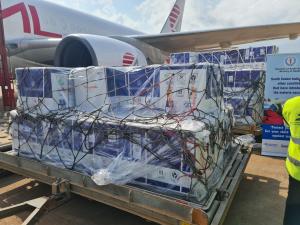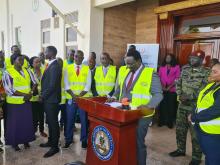South Sudan receives 645 000 doses of the latest malaria vaccine, boosting the fight against the deadly disease
Juba, 31 May 2024—In a historic step towards safeguarding children's lives and alleviating the high incidence of malaria in the country, the first consignment of the R21 malaria vaccine arrived in Juba today. The Ministry of Health received over 645 000 doses, which will be distributed to 28 counties with the highest malaria burden as plans continue to scale up nationwide.
Malaria is the biggest killer of children in South Sudan. The country grapples with one of the highest malaria incidence rates in the region. In 2022, South Sudan had an estimated 2.8 million cases and 6680 deaths. The country has one of the region’s highest rates of malaria incidence with an estimated 7630 malaria cases and 18 people dying of the disease every day.
“Malaria is a major concern for our country. We are committed to reducing the impact of malaria and improving the health outcomes for our children,” said Honourable Yolanda Awel Deng, Minister of Health “The continued use of this vaccine, alongside other preventive measures such as insecticide-treated bed nets and timely access to medical care, will be instrumental in our efforts to eliminate malaria in South Sudan.”
The joint efforts of The Ministry of Health, Gavi, the Vaccine Alliance, UNICEF, WHO, and health partners demonstrate the shared commitment to integrating these life-saving vaccines into the national immunization program. The endorsement of the R21 vaccine by the WHO, following the introduction of the RTS,S vaccine elsewhere on the continent, marks a turning point in the malaria elimination programme and will ensure a more robust supply of the vaccines for malaria-affected countries – particularly in Africa.
These vaccines have proven safe and effective in protecting children from malaria, potentially saving countless lives. With support from Gavi, UNICEF is working to procure enough vaccines to immunize over 45 million children worldwide in the coming years.
“The expanded availability of malaria vaccines heralds a new chapter in combating this deadly disease. Governments' proactive engagement and health systems' preparedness are pivotal in facilitating the successful rollout of the immunization programme. Training, communication strategies, and robust cold chain infrastructure are essential components in ensuring the widespread distribution of these important vaccines to protect the children of the country,” said Hamida Lasseko, UNICEF South Sudan Representative.
This milestone not only signifies progress in the battle against malaria but also underscores the collective commitment to safeguarding the health and well-being of children in South Sudan and beyond.
“Malaria remains a leading cause of illness and death in South Sudan, particularly among young children. The inclusion of the malaria vaccine in the routine immunization program represents a crucial addition to the existing arsenal of malaria prevention and control measures. “The introduction of the malaria vaccine is a pivotal development in our fight against malaria,” said Dr Humphrey Karamagi, WHO Representative for South Sudan. “This vaccine provides an additional, effective intervention to protect children and reduce the burden of this devastating disease. Its integration into routine immunization will enhance our ability to deliver comprehensive malaria prevention to those most at risk.”
====================================================
About the Ministry of Health of South Sudan: The Ministry of Health of South Sudan is dedicated to promoting the health and well-being of the nation's population through comprehensive healthcare initiatives, disease prevention programs, and capacity-building efforts. With a steadfast commitment to achieving universal health coverage and combating infectious diseases, the Ministry collaborates closely with national and international partners to address the health challenges facing South Sudan.
About the World Health Organization (WHO): Founded in 1948, WHO is the United Nations agency that connects nations, partners, and people to promote health, keep the world safe, and serve the vulnerable – so everyone, everywhere, can attain the highest level of health. WHO leads global efforts to expand universal health coverage. We direct and coordinate the world’s response to health emergencies. And we promote healthier lives – from pregnancy care through old age. Our Triple Billion targets outline an ambitious plan for the world to achieve good health for all using science-based policies and programmes.
About UNICEF: UNICEF works in over 190 countries and territories to save children's lives, defend their rights, and help them fulfill their potential from early childhood through adolescence. As the world's leading organization for children, UNICEF tirelessly reaches the most vulnerable and marginalized children, providing health care, nutrition, education, and protection services that transform lives and build brighter futures.
For media inquiries, please contact:
Ministry of Health: Ministry of Health: Mary Denis Obat, Director of Health Education and Promotion, mobat43 [at] gmail.com (mobat43[at]gmail[dot]com)
WHO: Jemila M. Ebrahim, Communication Officer, +211 921 647 859, ebrahimj [at] who.int (ebrahimj[at]who[dot]int)
UNICEF: James Maiden, UNICEF South Sudan, Tel: +211921987487, jmaiden [at] unicef.org (jmaiden[at]unicef[dot]org)

